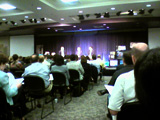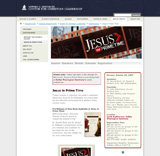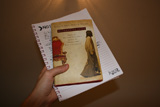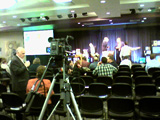 |
 |
 |
 |
 |
What is media’s responsibility and influence in cultural Christianity? This is the topic of the most recent DTS CCL conference. The guys and gals that plan these events put together a great line up of speakers with pastors, teachers, and theologians such as Darrell Bock, Dan Wallace, Ben Witherington, and Erwin Lutzer.
The conference focused around the two major questions of: what are the breakdowns in Christian transmission within our culture and what can Evangelicals do about it? It was identified that our culture today is Biblically illiterate and church leaders have catered to our user-friendly culture to create discipleship-lite (taste great and less-filling). The appraisal of this Biblical illiteracy is seen originating from a pressure on pastors to dumb things down in trying to give what the culture can digest, inadvertently resulting in a church which doesn’t look or act much different than the culture.
Media was shown as not always living up to its expectations. As a business, the media should be called to reveal a fair assessment of the world’s events and beliefs – however an honest confession from any journalist will reveal that everyone has biases, and the news is never entirely “fair or balanced.”
Ultimately, rather than simply showing viewers the “conversation,” media has been highly influential to shape the “conversation.” In addition to this contribution of influence that media produces, there is pressure upon those behind the screens to, for the sake of ratings, produce “exclamation” rather than “exposition.” Thus, the challenge is to get the “true” info out there, not the “noisy” info.
Peggy Wehmeyer-Woods, a former correspondent for ABC News, challenged the attendees to begin training smart, talented, and informed individuals as “missionaries” to go into the message producing networks, cable, internet, and radio media distributors. The calling is to produce both quality information, interviews and media content, and professional individuals to penetrate the conglomerates with a confession of correct orthodoxy that drives an honest assessment of what media reveals in terms of correct religious perspectives, not ratings motivated religious stereotypes.
In the final 2 sessions of the conference the panelists addressed the deficiency of our culture’s understanding of Christianity in belief and practice. First was the issue of canonicity vs. theology and which derives the other – because the result of the conclusion will reveal the nature of scripture and its place in Christianity. Darrell Bock showed how orthodox Christian theology was present long before a closed canon. Found within the earliest Christian texts are the tenants of: Schooling, Singing, and Sacraments. Schooling stands for how the local churches in the 1st century regularly professed doctrinal statements such as 1 Cor. 8 and 15 or Romans 1. Singing reveals the regular hymns (found in Colossians 1 or Philippians 2), which the local church would sing that contained deep theological truths. Finally, the Sacraments show the rites and processes of the local church in practice – all of which reveal the core elements of orthodox Christian doctrine before a closed canon or ecclesiological creed.
Finally, the question was asked, “How are we to minister to a culture that determines truth upon “what we like” rather than “what is true.” Evidence would show that we have all the good arguments on our side, but good arguments are not going to win the heart. Thus, the answer must be not simply speaking the truth – but speaking the truth in love.
Evangelicalism has a long road ahead to undo that which has been presented as the face of Christianity by many of our leaders. The reality is that effectively revealing the gospel, so that it impacts the core of people’s lives, is not going to be done solely through the media or literature, rather it will be done in the lives and lifestyles of the people in the local churches as they are going day by day throughout a watching world that needs to both hear and see Christ.
